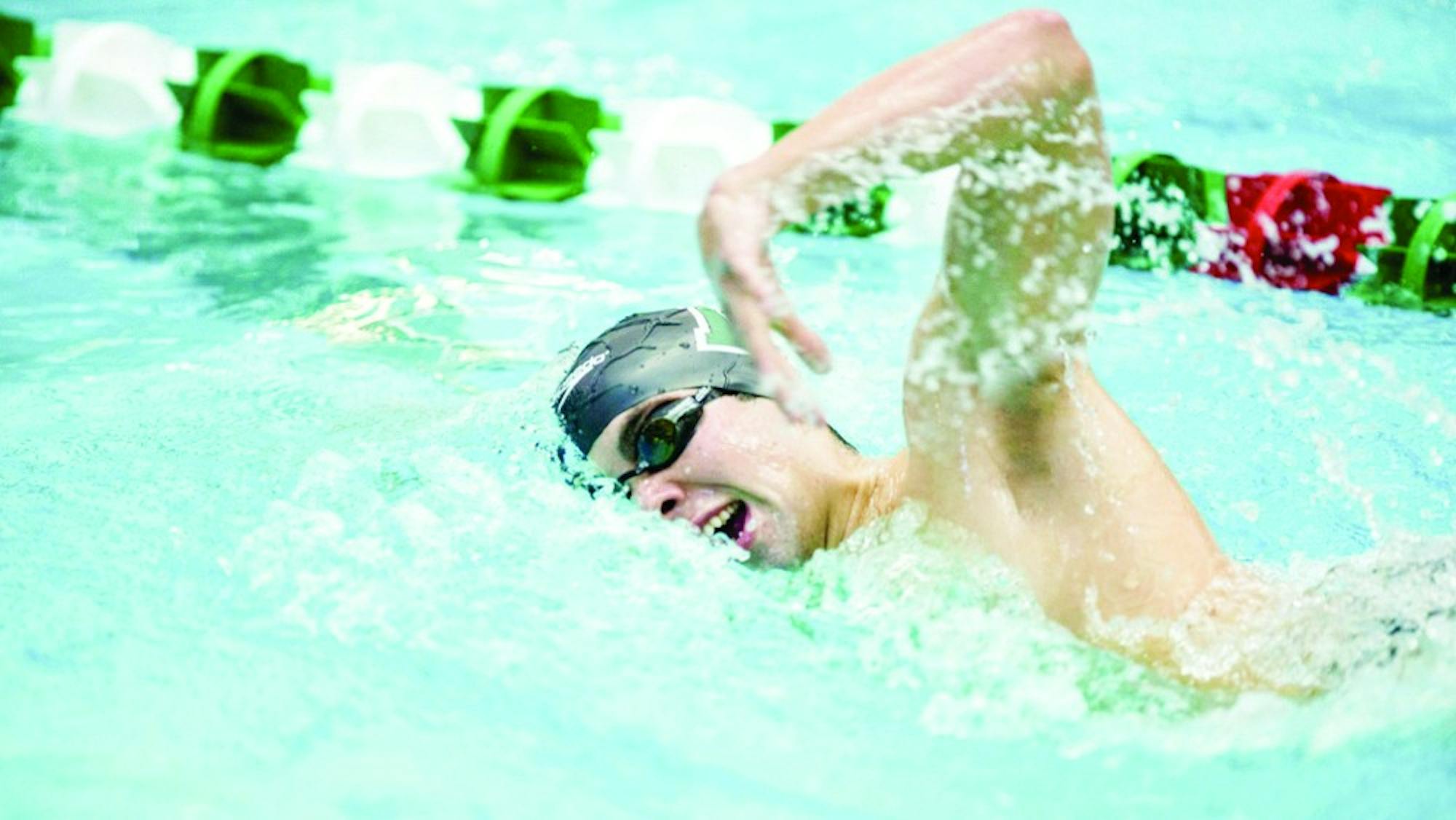Everybody loves an underdog. Whether it’s Rudy Ruettiger or the Hickory Huskers, there’s nothing like watching an athlete or a team rise above expectations to achieve something great. We can add the Dartmouth men’s swimming team’s co-captain Joby Bernstein ’17 to the list — quite an accomplishment for a kid who was afraid to enter water for two years after his mother tried to jump-start his swimming career.
He didn’t come to Dartmouth to swim. Bernstein came for the academics. In high school, he prioritized studying over swimming and wasn’t fast enough to get looks from Division I schools. It wasn’t until his final high school meet that Bernstein decided he would try to swim at Dartmouth, where he had already been accepted, as a walk-on — unknown to the coaching staff.
“I came to Dartmouth for academic reasons and because I loved Hanover and wanted to be in the outdoors,” Bernstein said. “I continued to swim in the offseason and showed up at Dartmouth unaware that I was supposed to email the coaches to tell them I wanted to walk on. At the first practice, the women’s swimming team’s captain came up to me and told me it was not time for club swim.”
It was a rough start to Bernstein’s collegiate swimming career. But after a month of rigorous preseason workouts, during which Bernstein did not even know where the varsity swimming locker room was located and remained secluded from team activities outside the pool, he persevered and earned a spot on the team — a team that has meant the world to him.
“Despite the awkward start, I fell in love with the team,” Bernstein said. “We always spend so much time together, whether it is at 5 a.m. for lift or morning swim, trying to stay awake in class together before heading back to the pool and even other Dartmouth activities. Having a team there for me during my entire career was a great part of my experience.”
So how did Bernstein go from an unknown walk-on with a self-professed fear of drowning to a standout in the pool? Go back to the beginning of Bernstein’s swimming career — his first swim meet at age eight — and you’ll understand just how far he had to go.
“The first time I dived in, my goggles fell off, and I began to swallow water as I clung to the lane barrier,” Bernstein said. “Before my second race, I had to change suits because I was wearing a suit with the wrong team’s logo. The only alternate suit available were normal swim trunks. They fell straight off right after I jumped in.”
Bernstein has grown into swimming during his four years at Dartmouth. While he did not consider himself a distance swimmer before college, Bernstein has embraced the pain and grind of long distance races that have guided his transformation in the pool and perhaps his success in the classroom. Bernstein credits Dartmouth’s training regimen with helping him cut 25 seconds off of his 500-yard freestyle time in his first collegiate meet at Princeton University.
“The idea of distance events is something that I hold true to myself,” said Bernstein, who swam the 500-yard freestyle, 1000-yard freestyle and 1650-yard freestyle at this year’s Ivy League Championships.
His patience and endurance have paid off, earning him Academic All-Ivy honors and the Dartmouth’s John C. Glover Swimming Trophy, awarded to the team’s most inspirational member, for his efforts this past season. Bernstein was also bestowed the Lutkus Award for the second consecutive year as the Dartmouth swimmer or diver who has been an outstanding and consistent performer during the season while maintaining a high academic standing.
Spending time and effort in the pool has not kept Bernstein from being a leader inside and outside the classroom. An economics major with a double minor in public policy and environmental studies, Bernstein maintains a 3.94 GPA, serves as editor-in-chief of the Dartmouth Business Journal, leads the Dartmouth Investment and Philanthropy Club and is actively involved in the Dartmouth Outing Club. A glimpse of Bernstein’s activities and accomplishments makes you wonder how he had enough time for four years of distance swimming.
But this is the same student-athlete who once despised water, then underwent the trials of distance swimming and emerged a college swimmer who could hold his own. Bernstein believes if he can handle the pain of distance swimming, he can conquer exams and job interviews with ease.
“When you swim, everything is up to you to do your best, and you know it is going to be painful,” he said. “You are often in pain during races, you can’t breathe and you question if you can keep going. If you do decide to keep going and keep pushing, you teach yourself more about your own character and personality than anything else can.”




